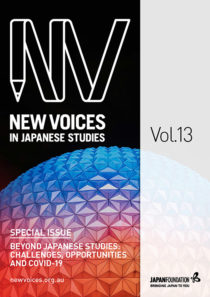Overview
New Voices in Japanese Studies is a non-commercial, open-access, peer-reviewed academic journal. It is published in-house by The Japan Foundation, Sydney with the aim of supporting emerging researchers with ties to Australia and New Zealand. In principle, New Voices in Japanese Studies publishes one issue annually.
New Voices in Japanese Studies was formerly published as New Voices. Volumes 1 to 6, published under the title New Voices, are registered under ISSN 2204-194X. Volumes 7 and beyond, published as New Voices in Japanese Studies, are registered under ISSN 2205-3166.
Guest editors
Each volume of New Voices in Japanese Studies is produced in collaboration with an academic guest editor. The Japan Foundation, Sydney gratefully acknowledges the assistance of guest editors in making these volumes possible.
Volume 13: Dr Gwyn McClelland
Volume 12: Dr Alexander Brown
Volume 11: Dr Emma Dalton
Volume 10: Dr Penny Bailey
Volume 9: Dr Olivier Krischer
Volume 8: Dr Adam Broinowski
Volume 7: Dr Shelley Brunt
Volume 6: Dr Katrina Moore
Volume 5: Dr Mats Karlsson
Volume 4: Dr Rebecca Suter
Volume 3: Dr Christine de Matos
Volume 2: Dr Matthew Stavros
Volume 1: Dr Yuji Sone
Double-blind peer review
New Voices in Japanese Studies is a refereed journal. All submissions are double-blind peer-reviewed by at least two independent academic experts to meet the Australian HERDC requirements for refereed journal status, and also benefit from feedback from the academic guest editor.
Editorial Advisory Board
Editorial advisory board members differ for each volume, depending on the discipline and subject area of submissions. Editorial board members for past volumes are listed at the links below. The Japan Foundation, Sydney gratefully acknowledges the invaluable time and expertise contributed by editorial board members in support of early-career publication by emerging researchers.
Volume 13 | Volume 12 | Volume 11 | Volume 10 | Volume 9 | Volume 8 | Volume 7 | Volume 6 | Volume 5 | Volume 4 | Volume 3 | Volume 2 | Volume 1 |
Archiving and Permalinks
To ensure greater access to the papers in this journal and support interlinking with other scholarly work, New Voices in Japanese Studies is a member of Crossref. New Voices in Japanese Studies is also archived in Pandora, the National Library of Australia’s web archiving service.
Plagiarism Policy
New Voices in Japanese Studies is committed to ensuring that all papers published are original contributions to literature in their field. Originality is vetted through supervisor recommendation at the submission stage and a rigorous peer review process. Beginning with Volume 10, the journal also employs Ithenticate plagiarism detection software to ensure the originality of published work. New Voices in Japanese Studies is committed to ensuring that all papers published here represent original contributions to literature, and all third-party sources are credited appropriately. Papers that do not meet these criteria will not be published. Refer to the Publication Policy page for further details.
Open Access, Creative Commons
New Voices in Japanese Studies is committed to open-access publishing. All content in New Voices in Japanese Studies is free to access, and no publication fees are required from authors.
In the spirit of furthering open access, all content in New Voices in Japanese Studies will be licensed under a Creative Commons CC-BY- NC-ND 4.0 licence starting from Volume 8.
Editorial Staff
New Voices in Japanese Studies is published by the following team.
Guest Editor
Series Editor, The Japan Foundation, Sydney
Design
New Voices in Japanese Studies wishes to thank Jon Zhu for logo and template design, and Kevin Vo for ongoing assistance with article layouts, web development and design.
Disclaimer
The views expressed in this journal are those of the authors, and do not necessarily coincide with those of the editors, the members of the Editorial Advisory Board or The Japan Foundation, Sydney.
Proudly Open Access

Related Links
Latest Volume
‘Beyond Japanese Studies’
Special Issue

